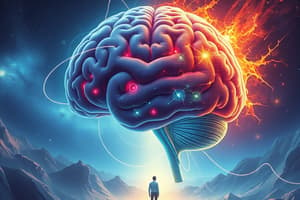Podcast
Questions and Answers
What is the primary focus of social comparison theory?
What is the primary focus of social comparison theory?
- Evaluating abilities and opinions by comparing oneself to others (correct)
- Determining self-worth based on social status
- Understanding personal history through autobiographical memory
- Comparing one’s achievements with past performances
Which of the following best describes upward social comparison?
Which of the following best describes upward social comparison?
- Evaluating yourself in relation to someone more successful (correct)
- Using personal achievements to gauge self-esteem
- Assessing your abilities against a peer with similar outcomes
- Comparing yourself to someone less successful
What is a characteristic of autobiographical memory?
What is a characteristic of autobiographical memory?
- It is always an accurate reflection of personal history.
- It follows a linear chronological order.
- It can be distorted to enhance perceived achievements. (correct)
- It disregards the recency effect in memory retrieval.
How do individualistic cultures generally view the self-concept?
How do individualistic cultures generally view the self-concept?
According to self-discrepancy theory, which aspects of self are compared?
According to self-discrepancy theory, which aspects of self are compared?
What is the term for the degree to which a study is designed to support a cause-effect conclusion?
What is the term for the degree to which a study is designed to support a cause-effect conclusion?
Which concept describes unintended factors that may influence study results alongside the independent variable?
Which concept describes unintended factors that may influence study results alongside the independent variable?
What does 'double blind' mean in an experimental context?
What does 'double blind' mean in an experimental context?
What is the term for specific beliefs about oneself that guide thinking?
What is the term for specific beliefs about oneself that guide thinking?
Which phenomenon occurs when intrinsic motivation decreases due to the introduction of external rewards?
Which phenomenon occurs when intrinsic motivation decreases due to the introduction of external rewards?
Which type of realism questions if the study's environment resembles real-world settings?
Which type of realism questions if the study's environment resembles real-world settings?
What do we call the process of predicting how one would feel in response to future events?
What do we call the process of predicting how one would feel in response to future events?
What refers to the ethical consideration where a participant is informed about the nature of the study before it begins?
What refers to the ethical consideration where a participant is informed about the nature of the study before it begins?
What is the primary effect of self-awareness according to self-awareness theory?
What is the primary effect of self-awareness according to self-awareness theory?
Which of the following describes the self-serving bias?
Which of the following describes the self-serving bias?
What outcome occurs when an individual withdraws from self-awareness?
What outcome occurs when an individual withdraws from self-awareness?
What is self-presentation primarily concerned with?
What is self-presentation primarily concerned with?
How do high self-monitors differ from low self-monitors?
How do high self-monitors differ from low self-monitors?
What is the concept of 'thin slices' in person perception?
What is the concept of 'thin slices' in person perception?
What is self-handicapping?
What is self-handicapping?
What motivates self-verification?
What motivates self-verification?
What is a primary benefit of having social connections?
What is a primary benefit of having social connections?
How does social psychology primarily differ from macro-level studies?
How does social psychology primarily differ from macro-level studies?
Which of the following statements represents a significant misconception related to social influence?
Which of the following statements represents a significant misconception related to social influence?
What defines a collectivist culture in social psychology?
What defines a collectivist culture in social psychology?
Which phenomenon indicates a common misconception about social interactions?
Which phenomenon indicates a common misconception about social interactions?
What has influenced the recognition of cultural contexts in social psychology research since the 1990s?
What has influenced the recognition of cultural contexts in social psychology research since the 1990s?
What does the social brain hypothesis suggest about human evolution?
What does the social brain hypothesis suggest about human evolution?
Which concept best describes the potential effects of reading on social skills?
Which concept best describes the potential effects of reading on social skills?
What are the two dimensions of mind perception?
What are the two dimensions of mind perception?
Which of these is an example of a situational cue that can affect person perception?
Which of these is an example of a situational cue that can affect person perception?
According to attribution theories, what does an internal attribution suggest?
According to attribution theories, what does an internal attribution suggest?
What does the Correspondent Inference Theory explain?
What does the Correspondent Inference Theory explain?
Which of the following is NOT considered a basic emotion recognized worldwide?
Which of the following is NOT considered a basic emotion recognized worldwide?
What does the Covariation Model by Kelley focus on?
What does the Covariation Model by Kelley focus on?
How accurate are people in detecting deception according to the material provided?
How accurate are people in detecting deception according to the material provided?
What role does non-verbal behavior play in communication?
What role does non-verbal behavior play in communication?
Flashcards are hidden until you start studying
Study Notes
Social Psychology Overview
- Social brain hypothesis posits that human brains evolved for social connectivity, aiding survival and success.
- Strong social ties enhance mental and physical health, contribute to longevity, and delay aging.
- Social psychology examines how individuals think, feel, and behave in social contexts, employing scientific methods over folk wisdom.
Folk Wisdom
- Reading improves empathy and understanding of social interactions; belief that reading enhances people skills is true.
- Pay can shift motivation from internal satisfaction to external incentive, impacting task enjoyment.
- Social pressures can lead individuals to act against their moral beliefs, illustrated by Milgram and Stanford Prison Experiment.
- Both "birds of a feather flock together" and "opposites attract" are true, highlighting the complexity of social relationships.
Cultural Psychology
- Research in social psychology is embedded within cultural contexts, recognized more prominently post-1990s.
- Culture encompasses shared meanings, values, and practices within large groups.
- Individualistic cultures prioritize personal achievements and independence, while collectivist cultures emphasize group cohesion and interdependence.
Self Concept
- Self-concept comprises the total beliefs about one’s attributes and is flexible.
- Influenced by introspection, affective forecasting (often inaccurate), and self-perception—understanding oneself through behavior observation.
- Intrinsic motivation fosters engagement in activities for enjoyment, whereas extrinsic motivation is driven by rewards or punishments.
Overjustification Effect
- Overjustification occurs when intrinsic motivation diminishes due to external rewards, demonstrated in Lepper et al. (1973) study on children and markers.
Social Comparison Theory
- People assess abilities and opinions by comparing themselves to others.
- Upward social comparison involves comparing with more successful peers, while downward comparison involves less successful ones.
Autobiographical Memory
- Memory of personal history can be biased to inflate achievements, with tendencies towards recency effects and notable flashbulb memories.
Self-Esteem and Theories
- Self-esteem encompasses how individuals evaluate themselves, showing stability across life with eight domains.
- Sociometer theory links self-esteem to social acceptance and approval.
- Self-discrepancy theory contrasts current self with ideal and ought selves, affecting self-esteem.
- Self-awareness theory triggers self-comparison against standards, potentially lowering self-esteem leading to behavior modification or avoidance.
Self-Regulation and Presentation
- Self-regulation involves controlling thoughts and behaviors to meet personal and social goals, which can be a depletable resource.
- Self-presentation, or impression management, is the effort to shape others’ perceptions, motivated by goals of gaining approval or influence.
Self-Verification and Monitoring
- Self-verification seeks consistency between others' perceptions and one's self-concept, potentially clashing with self-enhancement motives.
- Self-monitoring varies; high self-monitors adapt behavior for social situations, while low self-monitors are more principled, focusing less on social feedback.
Person Perception
- Thin slices refer to making quick judgments about others based on minimal information, demonstrating near-instantaneous accuracy.
- Context influences perceptions; cultural and situational cues shape interpretations of others’ behaviors.
- Mind perception involves attributing human-like mental states to entities, depending on perceived agency and experience.
Non-Verbal Behavior
- Non-verbal cues include body language and facial expressions, revealing feelings without words; six basic emotions recognized globally.
Deception Detection
- Accurately identifying deception is challenging, often no better than chance; auditory cues may offer insights.
Attribution Theories
- Attribution theorizes how individuals interpret behavior causes through internal (dispositional) or external (situational) lenses.
- Correspondent Inference Theory suggests a bias to link behavior to internal traits, accounting for factors like choice and expected behaviors.
- Covariation Model identifies three sources—consensus, distinctiveness, consistency—to analyze behavior sources.
Studying That Suits You
Use AI to generate personalized quizzes and flashcards to suit your learning preferences.




